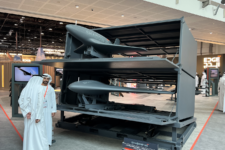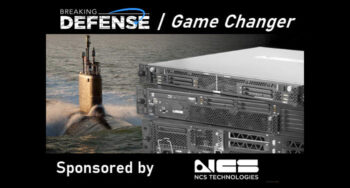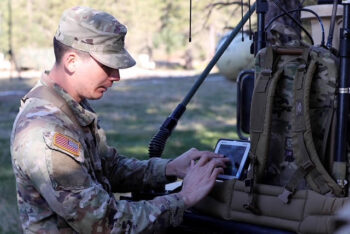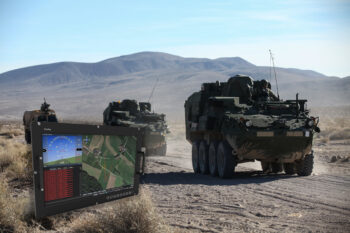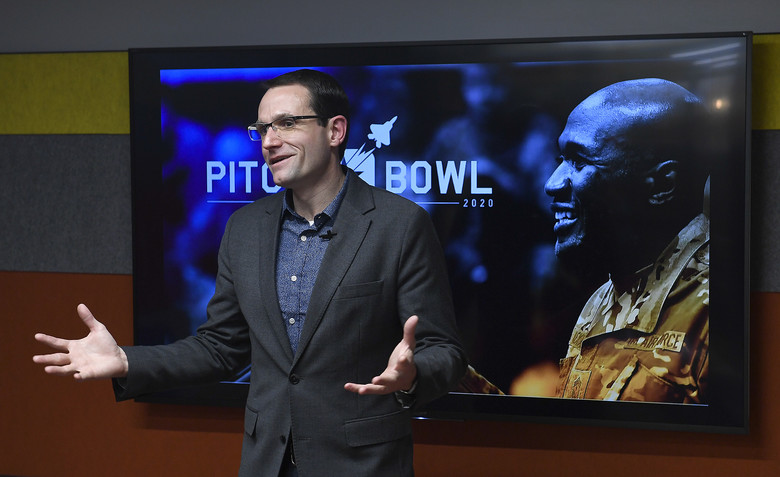
Will Roper kicks off the Air Force’s virtual “Pitch Bowl” March 13.
WASHINGTON: The new DoD-wide Space Acquisition Council met in an emergency session yesterday and, Will Roper says, is weighing how it help venture capital-backed space startups get access to small business loans under the $2 trillion CARES Act.
“We have a plan to get a plan,” on the startup issue, Will Roper, head of Air Force acquisition, told reporters in a video roundtable today, noting the Air Force has put a lot of time and energy in trying to leverage venture capital interest in commercial space to help bring innovative ideas to the national security space sphere.
The congressionally-mandated council reports to Air Force Secretary Barbara Barrett, and includes senior leadership of the Space Force, the Space Development Agency, and the NRO, as well as Roper.
The problem for space startups seeking CARES Act relief funds stems from an artifact in how the Small Business Administration (SBA) requires companies to certify their small business status — that is, as a firm with less than 500 employees.
Almost all the so-called ‘new space’ companies entering the market over the last five years are tiny, many with fewer than 100 employees. And they are almost all funded by venture capitalist (VC) firms and angel investors (read rich individuals). These types of investors generally put their money on a portfolio of companies to spread out the very high risk that many will fail before turning a profit.
And under SBA rules, if any startup is funded by a VC investor, it has to count as “affiliated” employees all those of at every other startup that VC investor funds. This can make is seem like a single startup has many more than 500 employees.
A letter released today by a group of industry organizations, including the Small Satellite Alliance and the Commercial Spaceflight Federation, to Treasury Secretary Steve Mnuchin, OMB Acting Director Russell Vought, and SBA Administrator Jovita Carranza, explains:
“The problem stems from the SBA’s definition of “small business” and the predominant startup financing mechanism: equity investment provided by venture capital firms, which typically make investments in a portfolio of young businesses, understanding that many will fail while a few will survive and thrive. To be eligible for the relief and support provided by the CARES Act – particularly access to the SBA’s 7(a) loan program – business must meet the definition of small business, which the SBA defines as having fewer than 500 employees. As part of that definition, the SBA applies an “affiliation rule,” requiring companies include in their employee count all the employees of companies affiliated with the applicant company. Many relationships can trigger affiliation, including blocking rights in investor agreements or owning a large enough position in the startup. Because venture capital firms typically invest in a number of young companies simultaneously, the affiliation rule would require venture-backed startups to aggregate the employees of all the unrelated companies in which their investors have equity positions, pushing many beyond the 500-employee threshold.”
Today’s letter follows a similar appeal on April 2 by 55 members of the House of Representatives seeking a waiver to the rule; and similar letters asking that at a minimum the SBA clarify the situation for VC-backed startups from National Venture Capital Association (NVAC) President Bobby Franklin and the Center For American Entrepreneurship (CAE). While the SBA since that time has sought to clarify the rules, industry sources say those instructions did not resolve the problem.
As Breaking D readers know, the Air Force held a special Space Pitch Day in San Francisco in November, awarding $22.5 million to 30 infant companies. The service also has teamed with the Techstars innovation hub and the governments of Norway and the Netherlands to foster space startups from allied countries.
Indeed, Roper has expended enormous personal energy attempting to imprint this new acquisition model — using Other Transaction Authorities and other rapid-prototyping acquisition methods — not just on space acquisition, but on all Air Force programs.
The Air Force has already successfully worked with SBA to allow the service to increase the value of awards under the SBA-managed Small Business Innovation Research (SBIR) process, in order to better bridge the “valley of death” between demonstrating a new technology and transitioning it into a DoD program of record. Under that new effort, led by AFVentures, Roper hopes to grant up to $1 billion to up to 40 “game changing” startups.
“Innovation is the new battlefield,” Roper argues, and he has strongly advocated that in order to out-innovate China and Russia, the US military needs to leverage the fact that 80 percent of the annual research and development dollars spent in the US are spent by commercial firms.
“In space, particularly, we’ve got to have a model that is very different than the one we used the last century,” Roper summed up. “We’re going to need to evaluate companies that have the potential to commercialize successfully as a delineator of who we partner with — because if we have to carry them completely under Space Force dollars, then it just jams out our ability to work more broadly. So, we have to have a very good reason, moving forward, to work with companies that have to be carried only on defense dollars.”
Hypersonic missile defense deserves predictable and sustainable funding
Keeping the Glide Phase Interceptor program on track needs to be a priority for the new administration and Congress, writes former NORTHCOM officer Howard “Dallas” Thompson.



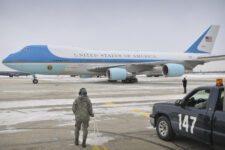



![RS179755_PMCS2620-FCAS-JPN-5A[1x1]](https://breakingdefense.com/wp-content/uploads/sites/3/2024/12/RS179755_PMCS2620-FCAS-JPN-5A1x1-e1734095138256-225x150.png)





